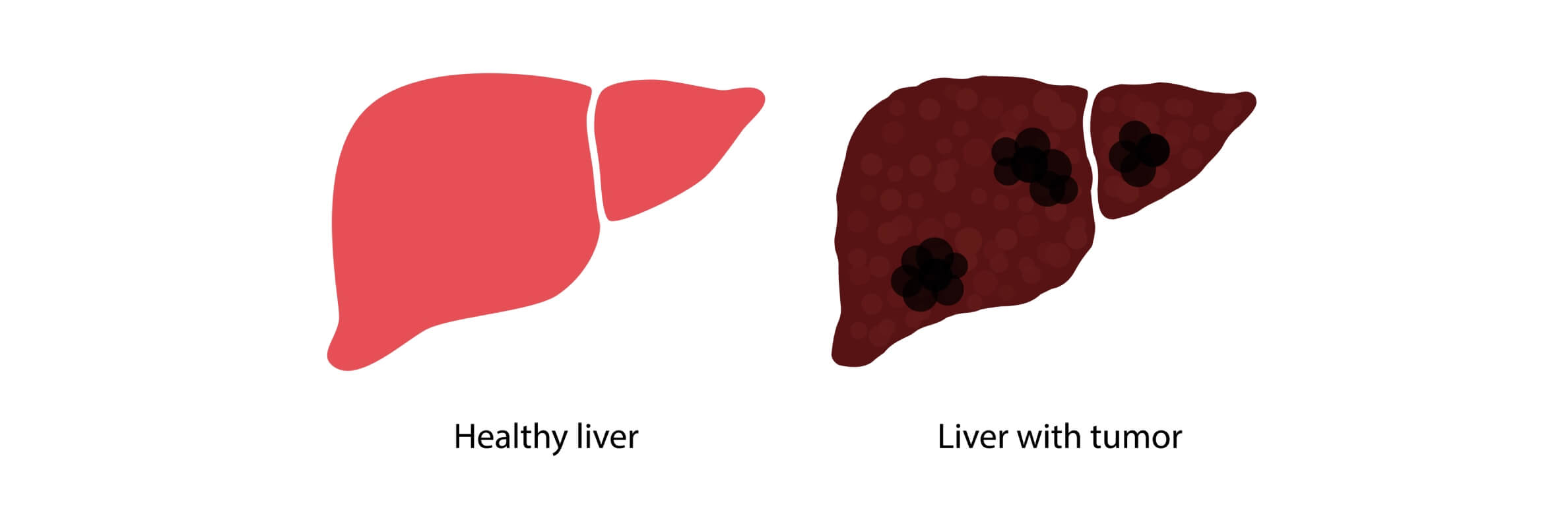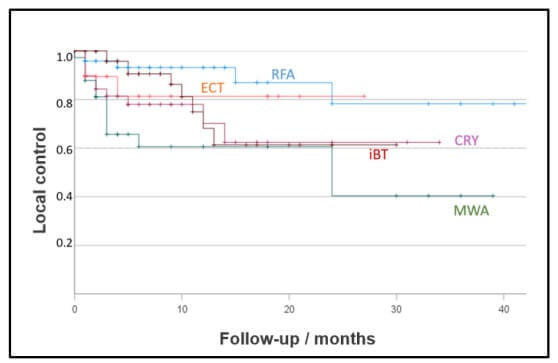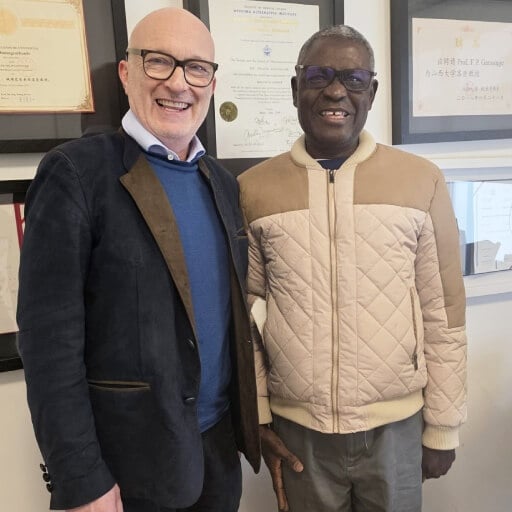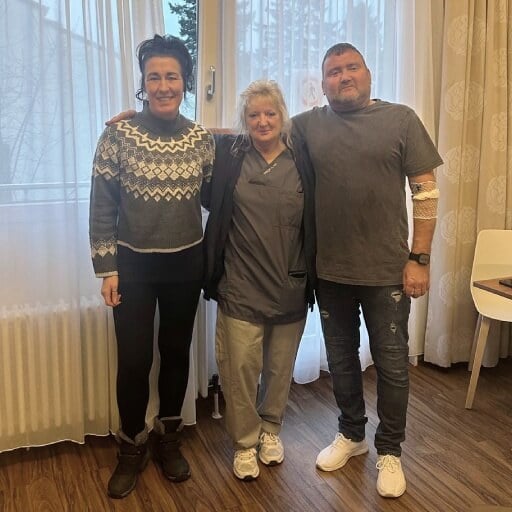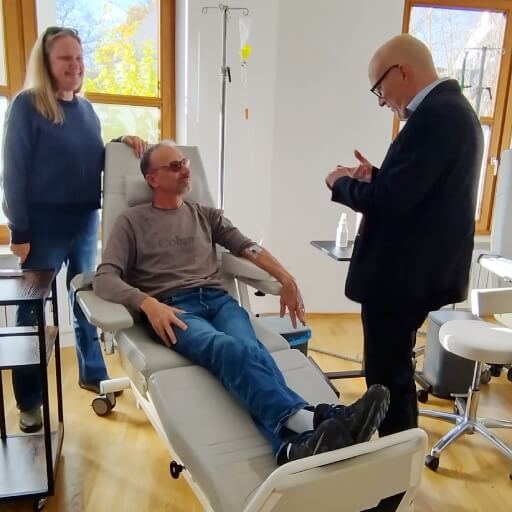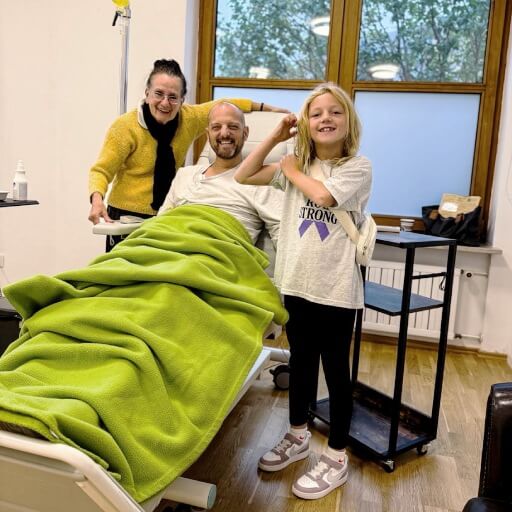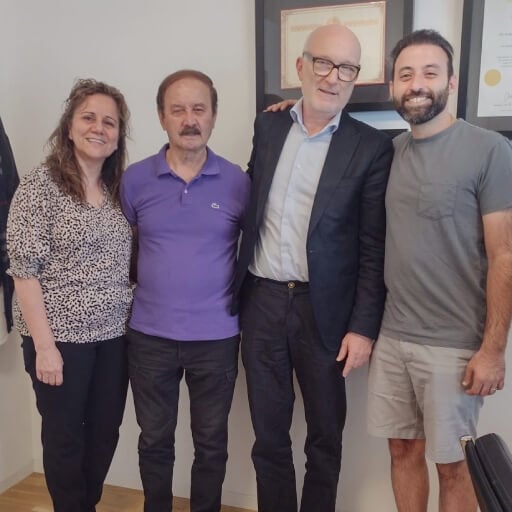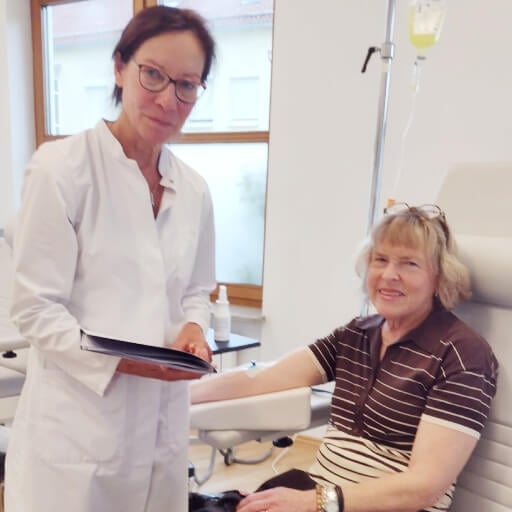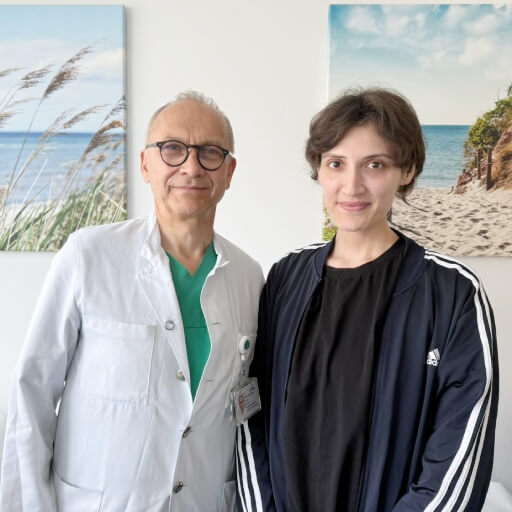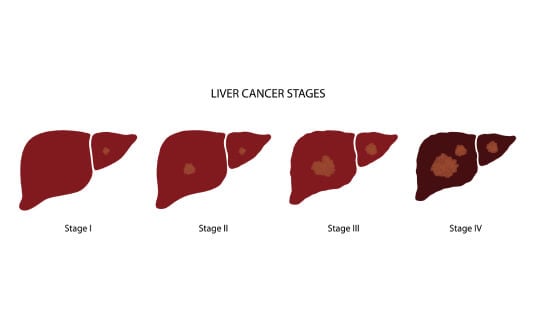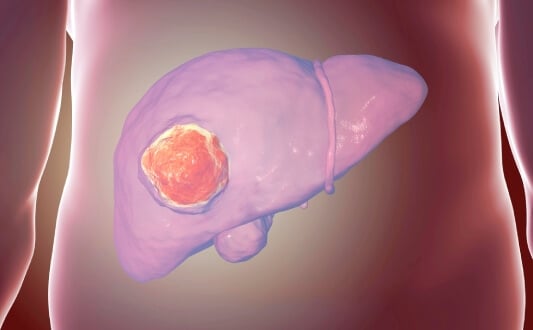Liver cancer is one of the most widespread types of tumors, ranking 6th among the most common cancers globally [1]. Statistics show that it is more common in men and is among the top 5 most common cancer types. Around 900,000 new liver cancer cases are detected in the world annually [2]. Meanwhile, the number of deaths is coming closer to the number of new cases. As of 2022, there were more than 750,000 deaths [3]. Although protocol treatments such as surgery and chemotherapy have saved numerous lives, they have shown that they are not enough for a complete cure. Patients at advanced stages of liver cancer still needed therapy, which would be both effective and well-tolerated. As a result of breakthroughs in medicine and technology, a number of innovative minimally invasive interventions are now available for patients with liver cancer.
What is Liver Cancer?
Liver cancer is the sixth most common type of cancer, making it one of the most prevalent worldwide [4]. It arises from liver cells (hepatocytes), causing hepatocellular carcinoma, which is one of the most widespread types of primary liver cancer. Around 900,000 new liver cancer cases are documented in the world annually, which demonstrates the wide spread of the disease. Multiple treatment options are available for patients with liver cancer, which show relatively good results and favourable prognosis. However, there is a list of other tumors that metastasize to the liver, causing multiple metastatic foci that have to be treated effectively. Due to these reasons, standard therapy of liver cancer is being constantly reviewed and novel therapies are being introduced to manage the growing need in more sufficient and life-sparing treatments.
Causes and Risk Factors of Liver Cancer
Both modifiable and non-modifiable risk factors increase chances of developing primary liver cancer. Non-modifiable risk factors include sex, race, and some inherited metabolic diseases.
Sex is the primary independent risk factor for developing liver cancer. According to statistics, men are diagnosed with this type of cancer at least 2 times more often than women.
Race is another non-modifiable risk factor of acquiring liver cancer. Multiple studies revealed that Asian people and Pacific Islanders have the highest chances of developing liver cancer, followed by Hispanic and Latino individuals.
Inherited metabolic diseases, such as hereditary hemochromatosis, are linked to the disruption of iron distribution, which leads to its accumulation in the liver. This can lead to cirrhosis and, subsequently, liver cancer.
Modifiable risk factors are as follows:
- Liver disease (viral hepatitis and cirrhosis)
- Alcohol abuse
- Tobacco smoking
Persistent infection with hepatitis B (HBV) and hepatitis C (HCV) viruses is a verified cause of liver cancer in the world. Causing persistent damage to the hepatic cells, HBV and HCV lead to the accumulation of alterations in the cell DNA and local and systemic immune responses. All together, it serves as a perfect foundation for liver cancer development. At the same time, alcohol is another risk factor, which is known as the number one reason for liver cirrhosis in the USA. Cirrhosis, which is a process of replacement of healthy liver parenchyma with a scar-like connective tissue, is often observed in patients with first-time diagnosed cancer. Therefore, alcohol increases the chances of acquiring cirrhosis, which may eventually lead to liver cancer. Smoking is another factor, which is associated with increased odds of getting liver cancer.
Diagnosis of Liver Cancer
A timely and precise diagnosis of liver cancer is essential for creating an effective cancer treatment strategy. Hepatocellular carcinoma often develops as a result of pre-existing disorders that cause persistent tissue damage, such as cirrhosis, HBV, or HCV. In this case, given the patient's previous medical history, non-invasive diagnostic procedures are an option. These include:
- Contrast-enhanced CT
- Contrast-enhanced MRI
- Contrast-enhanced ultrasound
Whenever the diagnostic criteria of liver cancer based on the Liver Imaging Reporting and Data System (LI-RADS) version of 2018 are met alongside a previous history of HBV, histopathology may not be considered. However, when the non-invasive criteria are not met, a biopsy of the tumor is required. Histopathology should be performed for all advanced stages of liver cancer as well. If a diagnosis of hepatocellular carcinoma is confirmed, a combined CT scan of the chest, abdomen, and pelvis need to be done for all patients.
As soon as the diagnosis is verified, additional tests are administered for precise tumor staging, which consequently helps to guide cancer treatment. These include:
- Serum biomarkers such as AFP, AFP-L3, and DCP
- Gadoxetic acid-enhanced MRI (when curative treatments such as ablation and liver resection are considered)
Noteworthy, doctors recommend assessing the biomarkers before and after curative treatments, as high levels of these substances are linked to cancer treatment resistance and lower survival rates. Consequently, staging of liver cancer is based on both liver function and the patient's overall functioning by ECOG PS scale, which are perfectly summarized in a Barcelona Clinic Liver Cancer (BCLC) Staging System. According to it, there are 5 stages of liver cancer:
- Very early stage (0)
- Early stage (A)
- Intermediate stage (B)
- Advanced stage (C)
- Terminal stage (D)
The treatment choice is then recommended based on the stage of the disease, with ability to mediate treatment towards managing more advanced disease stages.
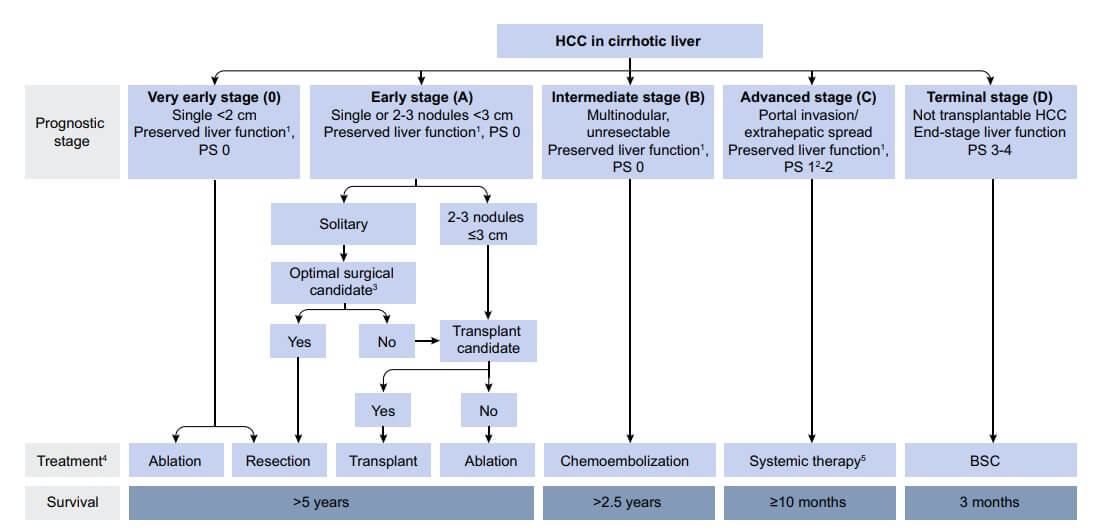
Source: European Association for the Study of the Liver
Liver Cancer Treatment Methods
The treatment of liver cancer is commonly guided by the specific type of the tumor, but, most importantly, it depends on the stage of the disease. Surgery is the foundation of therapy, whereas systemic therapies are reserved for advanced liver cancer.
Standard Treatment Methods for Liver Cancer
For early-stage hepatocellular carcinoma (HCC), surgical resection or liver transplantation remain the preferred curative options. Resection is suitable for patients with good liver function and localized disease, while transplantation is considered when underlying cirrhosis limits resection.
Hepatic resection involves removing the portion of the liver, which contains the tumor. It is generally indicated for patients with:
- Preserved liver function (Child-Pugh A)
- Absence of significant portal hypertension
- No major vascular invasion or extrahepatic tumor spread
- A single tumor or, in select cases, limited multifocal disease
Outcomes have improved thanks to innovations in imaging and 3D surgical planning, while techniques such as laparoscopic or robotic resection are gaining traction for select cases. However, according to new information, recurrence rates remain high, with 5-year recurrence observed in up to 70% of cases, underscoring the need for novel therapies.
Liver Transplantation
For patients with underlying cirrhosis, liver transplantation (LT) is often the most appropriate curative option. It not only removes the tumor, but also treats the underlying liver disease. Eligibility criteria for LT are most commonly based on the Milan Criteria and include:
- A single tumor ≤5 cm
- Up to 3 tumors, each ≤3 cm
- No vascular invasion or extrahepatic metastasis
Transplantation candidates must undergo comprehensive evaluation and are typically placed on a long waiting list, which significantly reduces survival chances.
Systemic treatments, such as radiotherapy and chemotherapy, are not among the first-line treatments for early-stage liver cancer. Nevertheless, they become the most valuable options for patients with advanced stages of the disease.
Innovative Therapies for Liver Cancer
Doctors are actively introducing novel medical techniques into multidisciplinary liver cancer management strategies. The most prominent of these minimally invasive techniques are transarterial chemoembolization (TACE), thermal ablation, dendritic cell therapy, electrochemotherapy, and cryotherapy.
Transarterial Chemoembolization (TACE) for Liver Cancer
Once a breakthrough in medicine, now TACE is a cornerstone for intermediate-stage hepatocellular carcinoma treatment [5]. The technique delivers chemotherapy directly to the tumor while simultaneously obstructing its blood supply. As a result, it maximizes local chemotherapeutic effect on the tumor without systemic exposure. Recent studies have shown that by combining chemoembolization with systemic therapies, such as monoclonal antibodies or dendritic cells, doctors can significantly improve progression-free survival. One of the recent studies informed that this combination nearly doubled the median progression-free survival to 15 months compared to TACE alone. Above that, TACE is an invaluable option for advanced stages of the disease, especially accompanied by systemic treatments like radiotherapy and chemotherapy.
Thermal Ablation Techniques for Liver Cancer
Thermal ablation, including radiofrequency (RFA) and microwave ablation (MWA), is a novel minimally invasive intervention that is suggested for individuals with early-stage HCC. Having proved their significance in multiple clinical settings, RFA and MWA are now officially part of liver cancer treatment guidelines. Advancements in imaging, particularly MRI-guided techniques, have additionally enhanced their precision. One of the decade-long studies reported a median overall survival of 73.8 months for patients undergoing MRI-guided thermal ablation, with 1-, 3-, and 5-year survival rates of 98.3%, 87.8%, and 62.9%, respectively.
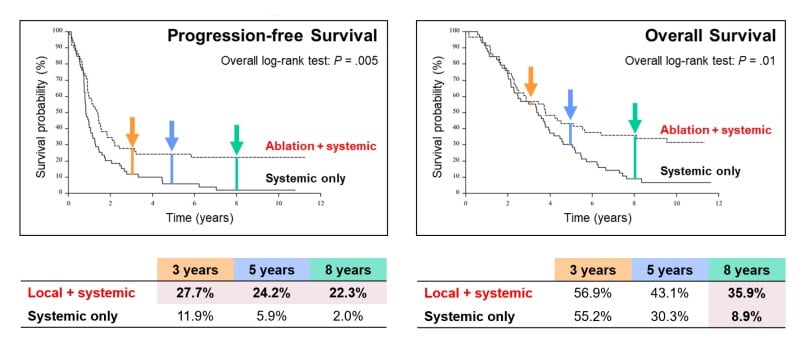
Source: Ruers T et al. Local Treatment of Unresectable Colorectal Liver Metastases: Results of a Randomized Phase II Trial. J Natl Cancer Inst. 2017 Sep 1;109(9)
It is also the preferred option for centrally located tumors up to 2 cm, regardless of whether they are metastatic or primary. This is crucial for preserving critical structures. Both MWA and RFA, when accompanied by systemic treatments, have demonstrated superior efficacy as opposed to systemic treatment alone. This is especially promising for patients with advanced liver cancer, for whom therapeutic options are limited.
Electrochemotherapy (ECT) for Liver Cancer
Electrochemotherapy (ECT) offers a novel approach for liver tumors. It is a breakthrough technique that combines chemotherapy with electric pulses to increase drug uptake by malignant cells. Above that, electrochemotherapy is known to have one of the best local tumor control rates compared to other ablation techniques.
*Data of Prof. Dr. med. Attila Kovács
Clinical studies have demonstrated high complete response rates, with one phase II study reporting an 84% complete response per treated lesion in HCC patients. ECT is particularly beneficial for tumors located near large blood vessels, where traditional ablation methods are less effective. Noteworthy, ECT can enhance the immune response, which makes it a perfect companion for immunotherapy.
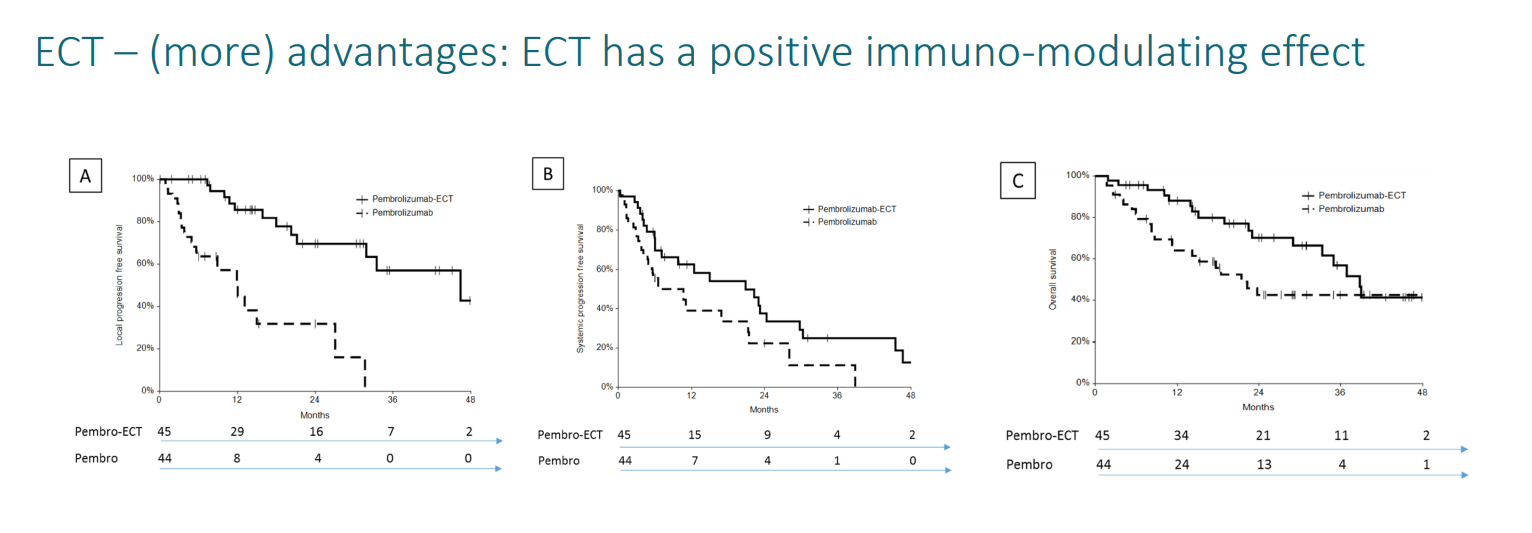
*Data of Prof. Dr. med. Attila Kovács
An additional benefit of this treatment option is its radiosensitizing effect. This is especially valuable for advanced liver cancer, as ECT can significantly improve the response to radiotherapy.
Cryoablation for Liver Cancer
Cryoablation is a minimally invasive technique that is based on a targeted freezing, which leads to tumor necrosis [6]. It is particularly valuable for liver tumors, which are located near large blood vessels and in patients with impaired liver function. Cryoablation is indicated for very early and early stage liver cancer patients. Clinical studies have demonstrated that cryoablation has comparable local control rates to radiofrequency ablation, with lower post-procedural pain and a favorable safety profile. A 2023 meta-analysis found 1-year and 3-year survival rates of 89% and 62%, respectively, in early-stage HCC patients undergoing cryoablation. Due to such promising results, cryoablation is being increasingly used both as a standalone therapy and in combination with other tissue-sparing interventions such as TACE.
Dendritic Cell Therapy for Liver Cancer
Dendritic cell therapy is a subtype of immunotherapy that represents a promising frontier in liver cancer treatment. Dendritic cells are so-called "guards" of the immune system, which are called to recognize malignant cells and initiate a full-scale immune response towards them. For such a breakthrough in medicine, the discoverer of dendritic cells Ralph Steinmann was awarded with a Nobel Prize in medicine [7]. Clinical trials have demonstrated that dendritic cell-based vaccines can elicit targeted, tumor-specific immune responses, which improve survival rates in liver cancer patients up to 60% in some cases. As a part of a comprehensive medical approach, dendritic cell therapy is exceptionally well tolerated by patients. Multiple research reported little to no adverse effects after administering a dendritic cell vaccine, which highlights its promising role in the treatment of advanced and intermediate stages of liver cancer.
To get a broader perspective on the main indicators of different treatments, feel free to look through the table of comparison for liver cancer treatments. The table offers survival and response rates, potential side effects, and the approximate cost of treatment.
Comparative Table: Liver Cancer Treatments Abroad
| Characteristics/Therapy type | 2-Year Survival Rate | Response Rate | Duration | Side Effects |
|---|---|---|---|---|
| Standard Treatment | ~25% for advanced cancer | Less than 10% | Several cycles | Severe (nausea, fatigue, hair loss, immunosuppression, skin irritation) |
| Innovative Methods | ~60% for advanced cancer | 45-65% | Up to 4 sessions | Mild (localized discomfort) |
*Booking Health data
Rehabilitation After Liver Cancer Treatment
Standard treatments for patients with liver cancer are commonly quite exhausting. A whole list of adverse effects have a notable negative impact on a patient's life and already compromised health. Cancer rehabilitation is a supportive therapy program that is part of comprehensive liver cancer management. This program addresses mobility problems, as well as cognitive and memory disorders. Cancer rehab specialists can help manage a variety of health issues that arise during systemic treatment. These include:
- Pain
- Swelling
- Neuropathy
- Limited range of motion
- Troubles chewing and/or swallowing food
Above that, cancer rehabilitation helps to overcome mobility challenges resulting from liver cancer treatment. This is crucial because it helps patients deal with day-to-day activities, such as climbing the stairs, walking, or even dressing and showering. All of that is possible due to a large team of medical professionals, including:
- Physiotherapists
- Dietarians
- Psychologists and psychiatrists
- Speech therapists
- Occupational therapists and others
Cancer rehabilitation may also be suggested prior to undergoing systemic treatment (the so-called prerehab). This allows doctors to assess the patient's health state and functional capacity before the treatment starts and offer procedures to prepare for the upcoming chemo- or radiotherapy.
Innovative therapies, on the contrary, do not usually require any prior preparation. Though a standard examination or a number of diagnostic tests may be required, novel treatments are usually patient-friendly due to their generally favorable profile. The few side effects that occur after treatment usually do not require special rehabilitation. With dendritic cell therapy, for example, patients can leave the hospital on the day of the injection. Minimally invasive procedures, such as transarterial chemoembolization or thermal ablation, require small cuts, which can produce some discomfort or swelling on the site. Nonetheless, these are moderate and resolve within a couple of days. Created to be patient-friendly, novel liver cancer treatment options generally have shorter and easier recovery with little to no need for a hospital stay.
Advanced Liver Cancer Management: When Hope Means Looking Forward
A stage 4 liver cancer diagnosis may feel like a moment when all the options are narrowing dangerously. Oftentimes, the focus shifts to managing symptoms rather than actively treating the disease. This is the time when you may be led to believe that there's little left to be done. However, this stage does not have to mark the end of your fight. In fact, it can be the start of a broader, more determined and mindful approach to care.
While curing advanced liver cancer completely may not yet be possible in many cases, it doesn't mean treatment stops here, especially not at your country's borders. Leading cancer centers, including those in Germany, are expanding the frontiers of care. From novel systemic therapies to highly targeted interventions like thermal ablation, the treatment of liver cancer abroad offers new hope to patients seeking options beyond what is locally available.
Focused on prolonging survival, standard treatment options do not prioritize the patient's comfort and quality of life. Meanwhile, access to global oncology expertise and next-generation therapies can indeed transform life and bring back the life you deserve. Emerging treatment protocols, personalized therapy, and participation in clinical trials launched by the best international cancer clinics in Germany may provide a path forward once lost.
Choosing to explore treatment options internationally doesn't mean giving up. It's expanding the possibilities for living. By seeking second opinions and remaining open to innovative cancer treatment solutions, patients with advanced liver cancer can take back a measure of control. A diagnosis is not a conclusion, but rather a call to explore every opportunity wherever they may be found.
What Makes a Good Hospital for Liver Cancer Treatment?
As we previously mentioned selecting one of the top liver cancer hospitals in the world can influence treatment outcomes and long-term survival. The best hospital for liver cancer treatment can offer a combination of advanced medical technologies, liver cancer alternative treatment and experienced specialists. Moreover it can provide a personalized approach to care (customized to unique medical needs).
Primary features that define a leading liver cancer clinic include:
Multidisciplinary Tumor Boards. Collaboration between different specialists (hepatologists, oncologists, radiologists, surgeons and transplant specialists) can ensure, that each case is evaluated from multiple perspectives 一 this approach allows for the development of highly individualized liver cancer therapy plans.
Advanced Therapeutic Technologies. Modern medical centers can provide advanced interventions (TACE, SIRT and Lutetium-177 radioisotope therapy) and alternative treatment for liver cancer. They can also offer effective options for both early and advanced-stage liver cancer.
Expertise in Minimally Invasive and Transplant Surgeries. High-volume centers usually demonstrate superior outcomes in laparoscopic liver resections and complex liver transplants.
Support for International Patients. The best hospitals can offer multilingual coordinators, medical interpreters and assistance with logistics 一 such support can make it easier for international patients to access the best treatment for liver cancer.
Comparison: Best Hospitals for Liver Cancer Treatment
| Rank | Hospital Name | Location | Technologies/Services |
|---|---|---|---|
| 1 | Asklepios Hospital Barmbek Hamburg | Germany | TACE, SIRT, transplantation |
| 2 | WEGE Clinic Bonn | Germany | Ablation procedures, radiosurgery, radiation therapy |
| 3 | University Hospital of Ludwig Maximilian University of Munich | Germany | Lutetium-177, percutaneous embolization, radiofrequency ablation, hepatectomy and liver transplantation |
Asklepios Hospital Barmbek Hamburg is one of the top liver cancer treatment centers abroad. It is known across multiple locations for its exceptional surgical and non-surgical interventions. This center can offer advanced procedures (TACE and SIRT) which allow for the provision of individualized solutions for patients with primary and metastatic liver tumors. The hospital also operates an advanced transplant program. This makes it possible to ensure comprehensive care for even the most complex cases. In addition multidisciplinary teams of specialists work closely to deliver patient-centered therapy plans focused on innovation and outcomes.
WEGE Clinic Bonn is considered among the best clinics for liver cancer. It is recognized for its advanced and minimally invasive surgical techniques (the clinic specializes in ablation procedures and radiosurgery). These strategies allow for the destruction of cancer cells with minimal impact on healthy tissue. Furthermore international patients can benefit from a fully integrated system of clinical support services. Hospital can be viewed as a leader in the field offering advanced medical technologies and holistic patient care.
University Hospital of Ludwig Maximilian University of Munich is one of the best hospitals for oncology in Germany. It can offer various innovative treatments for liver malignancies. Hospital provides access to Lutetium-177 radioisotope therapy and complex hepatobiliary surgeries. It is a major medical center for innovative cancer therapies which integrates advanced clinical research into daily practice. The hospital also has an international patient department. This helps ensure that patients from abroad can receive exceptional clinical care that meets their needs.
Liver Cancer Treatment Cost
Seeking liver cancer treatment abroad can vary significantly in cost, depending on the method chosen, the country and the specific locations of the clinics. Perhaps, our readers have noticed that our data suggest the best liver cancer treatment in world can be accessed in medical centers in Germany. These facilities can offer some of the most competitive prices globally (while maintaining high standards of care).
| Treatment Methods | Germany | Great Britain | USA |
|---|---|---|---|
| Standard Treatments | €80,000 - €150,000 full course | €90,000 - €165,000 full course | €100,000 - €180,000 full course |
| Innovative Methods | €25,000 - €60,000 full course | €70,000 - €120,000 full course | €100,000 - €150,000 full course |
*Prices may vary depending on the course of treatment and tumor characteristics.
The prices noted above include diagnostics, treatment, hospital stay and post-treatment support. However certain factors can affect the final cost, including the complexity of the case, the technologies used and the length of hospital stay.
A Medical Journey: Every Step of the Way With Booking Health
Finding the best treatment strategy for your clinical situation is a challenging task. Being already exhausted from multiple treatment sessions, having consulted numerous specialists, and having tried various therapeutic interventions, you may be lost in all the information given by the doctors. In such a situation, it is easy to choose a first-hand option or to follow standardized therapeutic protocols with a long list of adverse effects instead of selecting highly-specialized innovative treatment options.
To make an informed choice and get a personalized cancer management plan, which will be tailored to your specific clinical situation, consult medical experts at Booking Health. Being at the forefront of offering the latest medical innovations for already 12 years, Booking Health possesses solid expertise in creating complex cancer management programs in each individual case. As a reputable company, Booking Health offers personalized liver cancer treatment plans with direct clinic booking and full support at every stage, from organizational processes to assistance during treatment. We provide:
- Assessment and analysis of medical reports
- Development of the medical care program
- Selection of a suitable treatment location
- Preparation of medical documents and forwarding to a suitable clinic
- Preparatory consultations with clinicians for the development of medical care programs
- Expert advice during the hospital stay
- Follow-up care after the patient returns to their native country after completing the medical care program
- Taking care of formalities as part of the preparation for the medical care program
- Coordination and organization of the patient's stay in a foreign country
- Assistance with visas and tickets
- A personal coordinator and interpreter with 24/7 support
- Transparent budgeting with no hidden costs
Health is an invaluable aspect of our lives. Delegating management of something so fragile yet precious should be done only to experts with proven experience and a reputation. Booking Health is a trustworthy partner who assists you on the way of pursuing stronger health and a better quality of life. Contact our medical consultant to learn more about the possibilities of personalized treatment with innovative methods for liver cancer with leading specialists in this field.
Fighting Cancer Together: Treatment Journeys with Booking Health
Frequently Asked Questions of Our Patients About Liver Cancer Treatment
Send request for treatmentThe main types of liver cancer are hepatocellular carcinoma (HCC), which is the most common form, and intrahepatic cholangiocarcinoma or bile duct cancer. Less common types of liver cancer include angiosarcoma and hepatoblastoma (in children).
Common symptoms include:
- abdominal pain
- swelling
- unexplained weight loss
- fatigue
- jaundice (yellowing of skin and eyes)
- loss of appetite
- nausea
Diagnosis involves imaging tests such as ultrasounds, CT scans, and MRI scans. Laboratory tests also play an important role and typically include blood tests (including alpha-fetoprotein or AFP levels) and a liver biopsy to confirm the specific cancer type.
Standard treatment methods for liver cancer include:
- surgery (liver resection)
- local ablation
- embolization therapy like TACE
- radiation therapy
- systemic treatments like chemotherapy
- targeted therapy or immunotherapy
Innovative therapy is represented by immunotherapy, personalized medicine like dendritic cell vaccines, and radioembolization. Clinical trials are also available for novel drug combinations to expand the treatment landscape.
Survival rates typically depend on the disease stage and liver function. Localized HCC has a 5-year survival rate of 30-35%, while advanced stages may drop below 10%.
Non-surgical options for liver cancer include radiofrequency ablation, transarterial chemoembolization (TACE), radiotherapy, and systemic therapies such as immunotherapy.
A complete cure is rare in advanced stages, but treatment can significantly extend survival and improve quality of life. Innovative treatments, such as targeted therapy or immunotherapy, can improve survival rates.
Seeking treatment abroad can offer access to the latest advancements in cancer therapy, clinical trials, and cost-effective care, which are not available locally. Specialized centers in Germany offer comprehensive treatment strategies, including a combination of standard and innovative therapies, to boost treatment effect.
Liver cancer is a malignant disease affecting liver cells, most commonly in the form of hepatocellular carcinoma (HCC). It accounts for over 800,000 new cases globally each year. Risk factors include hepatitis B/C, cirrhosis, alcohol abuse, and fatty liver disease. Other types of liver malignancy include cholangiocarcinoma and metastatic liver tumors from colorectal or breast cancer.
Liver cancer treatment depends on the stage. For localized liver cancer treatment, options include liver resection, ablation, and transarterial chemoembolization (TACE). Advanced stages may require targeted therapy, immunotherapy, or selective internal radiation therapy (SIRT). Germany offers advanced liver cancer treatment using personalized, multidisciplinary approaches.
Yes, there is a potential cure for liver cancer in early-stage liver cancer cases. Surgical liver resection, liver transplantation, or local ablation techniques can result in long-term remission or cure. However, in later stages, the focus shifts to disease control and life extension.
Liver cancer immunotherapy strengthens the immune system to recognize and attack cancer cells. Immune checkpoint inhibitors (e.g., PD-1/PD-L1 blockers) and dendritic cells for liver cancer are considered promising options in Germany, often combined with other treatments to enhance immune response and slow tumor progression.
TACE for liver cancer (Transarterial Chemoembolization) is a minimally invasive procedure that delivers chemotherapy directly into the liver tumor via arteries, followed by embolization to block blood flow. This targets cancer cells while sparing healthy tissue and is effective in controlling localized liver cancer treatment and shrinking tumors pre-surgery.
Yes, metastatic liver cancer – especially liver metastases treatment from colorectal cancer spread – can be managed with surgery, TACE, radioembolization, or systemic therapy. While not typically curable, these treatments improve survival and quality of life, especially when initiated early.
Yes, innovative liver cancer treatments include radioembolization, proton therapy, electrochemotherapy, and immunotherapies like dendritic cell vaccines. Germany is a leader in delivering these options through highly specialized oncology centers.
Yes, liver cancer can recur, particularly in patients with underlying liver disease or after incomplete treatment. Continuous monitoring is essential, even after successful resection or ablation, as liver tumors may return in the same or different areas.
Germany is among the top destinations for international cancer treatment. The best hospitals for liver cancer in Germany offer world-class facilities, advanced diagnostics, and access to therapies like TACE, immunotherapy, and liver transplants. Medical coordinators, such as Booking Health, assist international patients in organizing efficient and stress-free liver cancer treatment in Germany.
For liver cancer, the 2-year survival rate is approximately 25% with standard treatments. However, innovative methods (e.g., dendritic cell therapy, TACE, and electrochemotherapy) can raise survival to around 60% in advanced cases.
In liver cancer, standard treatments achieve a response rate below 10%. In contrast, innovative approaches (e.g., thermal ablation or dendritic cell therapy) report 45-65%.
Standard treatment for liver cancer may involve several cycles of chemotherapy or combined therapy. In turn, innovative procedures (e.g., TACE or dendritic cell therapy) are typically completed within up to four sessions.
Patients undergoing standard treatment for liver cancer often experience severe side effects, including fatigue, nausea, and hair loss. On the other hand, innovative therapies (e.g., cryotherapy and electrochemotherapy) usually cause only mild, localized discomfort and are better tolerated.
For someone diagnosed with liver cancer, daily fatigue and discomfort can make life unpredictable. With advanced treatment methods (such as interventional radiology, dendritic cells and others) patients often notice improved energy and symptom control (especially when these methods are carefully combined).
The best hospital is one where a patient feels guided rather than overwhelmed. In Germany, clinics structure each day with clarity; doctors adjust treatments based on real-time responses and patients leave knowing what to expect next ㄧ reducing anxiety and creating a sense of control.
Germany is frequently chosen by international patients (here advanced therapies are paired with organized care). In Germany patients can access innovative therapies, that might not be available elsewhere.
The best hospitals for liver cancer treatment are those, that can offer advanced technologies, multidisciplinary care and extensive clinical experience with liver surgeries and therapies. Asklepios Hospital Barmbek Hamburg, WEGE Clinic Bonn and the University Hospital of Ludwig Maximilian University of Munich are considered among the best clinics for liver cancer in the world.
Choose treatment abroad and you will for sure get the best results!
Authors:
This article was edited by medical experts, board-certified doctors Dr. Nadezhda Ivanisova, and Dr. Bohdan Mykhalniuk. For the treatment of the conditions referred to in the article, you must consult a doctor; the information in the article is not intended for self-medication!
Our editorial policy, which details our commitment to accuracy and transparency, is available here. Click this link to review our policies.
Sources:
[1] World Cancer Research Fund. Liver cancer statistics. https://www.wcrf.org/preventing-cancer/cancer-statistics/liver-cancer-statistics/
[2] Harriet Rumgay, Melina Arnold, Jacques Ferlay et al. Global burden of primary liver cancer in 2020 and predictions to 2040. J Hepatol. 2022 Dec;77(6):1598–1606. doi: 10.1016/j.jhep.2022.08.021. [DOI] [PMC free article]
[3] Qianru Li, Chao Ding, Maomao Cao. Global epidemiology of liver cancer 2022: An emphasis on geographic disparities. Chin Med J (Engl). 2024 Sep 3;137(19):2334–2342. doi: 10.1097/CM9.0000000000003264. [DOI] [PMC free article]
[4] NIH, National Cancer Institute. Liver Cancer Causes, Risk Factors, and Prevention. https://www.cancer.gov/types/liver/what-is-liver-cancer/causes-risk-factors
[5] Evgenia Kotsifa, Chrysovalantis Vergadis, Michael Vailas et al. Transarterial Chemoembolization for Hepatocellular Carcinoma: Why, When, How? J Pers Med. 2022 Mar 10;12(3):436. doi: 10.3390/jpm12030436. [DOI] [PMC free article]
[6] Li-Zhi Niu, Jia-Liang Li, Ke-Cheng Xu. Percutaneous Cryoablation for Liver Cancer. J Clin Transl Hepatol. 2014 Sep 15;2(3):182–188. doi: 10.14218/JCTH.2014.00017. [DOI] [PMC free article]
[7] Roman Volchenkov, Florian Sprater, Petra Vogelsang, Silke Appel. The 2011 Nobel Prize in physiology or medicine. Scand J Immunol. 2012 Jan;75(1):1-4. doi: 10.1111/j.1365-3083.2011.02663.x. [DOI] [PubMed]
Read:
Treatment of stage 4 liver cancer in Germany
Article menu:
- What is Liver Cancer?
- Causes and Risk Factors of Liver Cancer
- Diagnosis of Liver Cancer
- Liver Cancer Treatment Methods
- Rehabilitation After Liver Cancer Treatment
- Advanced Liver Cancer Management: When Hope Means Looking Forward
- What Makes a Good Hospital for Liver Cancer Treatment?
- Liver Cancer Treatment Cost
- A Medical Journey: Every Step of the Way With Booking Health
- Frequently Asked Questions of Our Patients About Liver Cancer Treatment
Don't know where to start?
Contact Booking Health